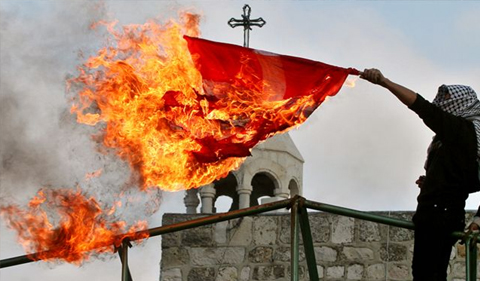
What Peaceful Religion?
Islam is a peaceful religion, we’re told. Islam is not about violence; not about hatred. Islam does not discriminate, they tell us.
The increasing, out-of-control violence over the publication of caricatures —cartoons, for Pete’s sake— of the Prophet Muhammad pretty much destroys that apologist argument.
Was the Danish publication of the offending cartoons justified? It was an editorial decision that has since been backed up by the principle of freedom of expression. Was it in good taste? Certainly the editor and the artist knew it would elicit a response, but unlikely foresaw such boiling hatred. In some ways, the contempt that Muslim communities are showing against Europe is more worrisome than what prejuidices are floating around European cities against Muslims. Although religious criticism is never going to sit well with true believers, any context the cartoons had has been swept under the rug and ignored, replaced not with vigorous public debate, but with the burning of embassies and the threats of violence, including deeply offensive calls in London warning of another train bombing.
Is the West supposed to never criticize Islam? This is not to suggest that criticisms of Christianity merely float over: indeed, in the United States, the release of the 1988 film “The Last Temptation of Christ” met with religious anger over its depiction of a Jesus who isn’t crucified and marries Mary Magdalene and fathers children. The advent of “The Passion of the Christ” also brought out the armies of the religious right, who denied any antisemitism of Mel Gibson’s picture and complained loudly over Christian bias in Hollywood. And of course, there’s the upcoming film based on “The DaVinci Code,” that has already run afoul of the Catholic Church for its wild-eyed theories of Jesus’ bloodline and such.
Yet in the West, particularly Europe, the long history of religious wars and their secular follow-ups has brought out a tolerance for religious dissent and criticism. People may not like it, but wholescale rioting over religion does not seem to be part of anyone’s experience anymore, and clerics aren’t clamoring for camera time with threats of violence. It is this aspect that is inexcusable, because whatever ignorance the cartoons expressed over latent European fears of Islam, the reaction and the violence confirms the worst aspects of those anxieties. And it begs a further question: what is appropriate criticism of Islam? If I were to write and publish an article that Muhammad did not have a revelation, and made up these alleged revelations that seemed rather convenient in their timing and content, does this mean I hate Islam? That I deserve for some cleric in the Middle East to declare me worthy of death? And worse, for someone living in the same country as I to carry it out?
When Salman Rushdie’s tome “The Satanic Verses” was published, there was similar (and similarly violent) protest, climaxing in the Ayatollah Khomeini’s fatwa (religious edict) that the author needed to be killed for insulting Islam. What was deeply troubling for me at the time was how one man on one side of the planet was declaring a death sentence against another in a different country with no respect for the latter country’s laws and traditions.
And that, my friends, is the crux of the matter: no matter how odious and disagreeable religious criticism is, freedom of expression is a Western value that just can’t exist because one wants to criticize the government or a politician. This tradition is part of the European experience. It is, undoubtedly, a deeply alien concept to immigrant communities where authoritarianism is still a fact of life. Whose conservative values do not tolerate dissent or open questioning, especially of religion. It is no secret that many Arab intellectuals find Europe to be better soil to voice those disagreements over faith and politics than at home. This alone does not make their opinions right, nor should they go unchallenged. But the right to express those ideas is as equally important at the right to oppose them. Yet no one has the right to threaten (much less carry out) violence and declare that religion is off-limits, lest anyone get offended.
The hypocrisy of Muslim communities is also staggering, when, as a German newspaper noted, Syrian prime-time television airs a “documentary” that depicts rabbis as cannibals. Lest we forget: antisemitism runs very deep in the Middle East, and the blood libel is alive and well, along with freely available copies of “The Protocols of the Elders of Zion.” And bear in mind, Middle Eastern governments do not issue edicts decrying the depicition of Jews or fight against anti-Jewish sentiment: on the contrary, they encourage it as a distraction against failed policies and political repression. Even more so, the world swiftly condemned Iranian president Mahmoud Ahmadinejad’s outrageous comments that Holocaust did not happen, but failed to light any Iranian embassies on fire. You may find the two issues unrelated, but they underscore how the Muslim world continues its own offensive caricatures of historical fact (by calling for a scientific inquiry into the issue of the Final Solution) while acting like a victim over the publication of cartoons.
Religious tolerance is an important aspect of our modern world, as well as keeping in mind the sensibilities of believers. And freedom of expression isn’t a license to print everything that floats through a person’s mind, but it is far better to debate those ideas and opinions civilly, rather than calling for violence and turning embassies into burning piles of rubbish. This, in the end, serves no one.